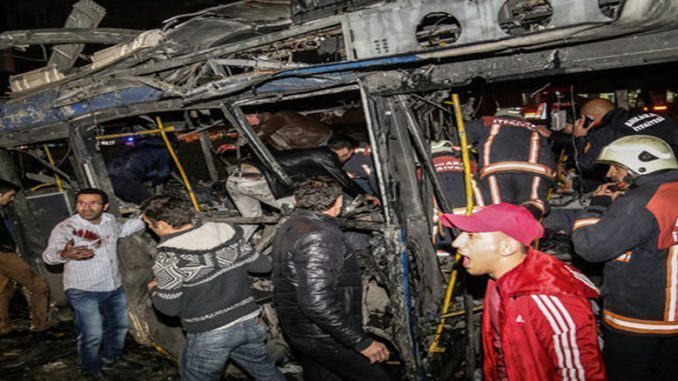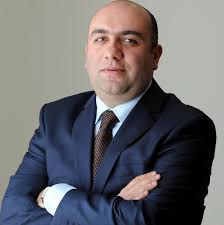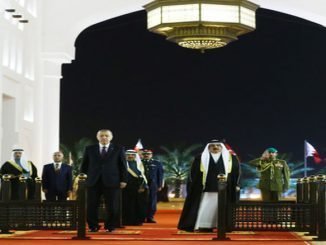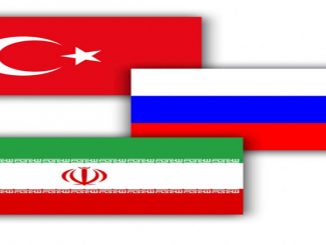
 BY: ÇETİNER ÇETİN
BY: ÇETİNER ÇETİN
Turkey has been facing serious attacks by PKK and Daesh terror organizations for the past 14 months. This spiral started with an attack on a tourist group in Istanbul’s Sultanahmet Square last year. A DAESH-linked suicide bomber killed 12 tourists and himself on Jan. 12, 2015. We were shaken by the PKK’s twin attacks after a football match in Beşiktaş and thought that it was a final when it conducted another attack on a bus carrying soldiers during a weekend break in Kayseri in the last month of 2016. Hundreds of people in Turkey lost their lives because of terror in 2016. When Reina nightclub, the most familiar entertainment venue in Istanbul which is preferred by almost all tourists visiting the country, was raked in the first hours of the new year, we saw that 2017 would be a challenging year, too.
Deputy Prime Minister Numan Kurtulmuş said the terrorist probably meant, “You will not be able to get rid of us in 2017,” adding that terrorists will be destroyed. The government expresses its determination. But terror organizations are given a task which they have to fulfill regardless of the government’s statements.
Turkey is fighting on two fronts. Not adequately supported by the West against radical groups, Ankara left behind three distressing years where our Syrian border has almost turned into a laboratory of terror organizations. Ankara’s tough stance against radical groups since 2015 attracted attacks into Turkey. But there was no other choice for Turkey than responding to radical groups in the region where the country is struggling to exist. Today Turkish troops are fighting Daesh in Syria. In addition to this war, Turkey is also waging a diplomatic war. In addition to a war against radical groups in Syria, Ankara is making efforts for a cease-fire around the country with Russia.
Daesh is responsible for the greatest terror attack in Turkey, which killed 100 people at Ankara’s train station in Oct. 2015. Since then, terrorists have consistently managed to enter the centers of Turkish metropolises, claiming many lives in a number of attacks.
Attacks reveal how strong a regional network terror supporters have. Prosecutorial reports on all terrorist attacks, especially the Sultanahmet bombing, disclose that radical organizations and the PKK very well make plans to escape police and intelligence forces.
As our border with Syria was open until 2015 because of humanitarian aid and open-door policy for Syrians, no one could give reliable information about how many Daesh or PKK supporters lived in Turkey. With the Merasim street attack in Ankara, we saw that not only Daesh, but also the PKK infiltrated Turkey through the same method. As terror organizations wanted to create a chaos environment in the country for 14 months, they have come to compete with each other to achieve what Gülenist soldiers could not do during the failed July 15 coup attempt. They intensified attacks in certain areas, which they choose in order to give certain messages, in different periods of time.
We experienced one of the most painful examples of this in the first hours of 2017. The attack where an armed attacker killed 39 people injured 65 others during New Year celebrations at the nightclub caused a terrifying sense of helplessness in many of Istanbul’s residents. As opposed to the previous two attacks, there was little doubt that Daesh was responsible for this attack, and that it was a retaliation against the attack of Turkish military forces against Daesh positions in al-Bab.
Daesh made terrible statements over the past few weeks, vowing that it would actualize this. President Recep Tayyip Erdoğan condemned the attack, saying that the government knew that the attacks conducted against Turkish citizens by various terror organizations were not independent of regional developments. Indeed, Erdoğan clearly expressed that organizations were assigned to drag the country into chaos after July 15, underlining that they would wage a resolute and firm struggle and would not step back. Moreover, Erdoğan has garnered the greatest public support ever in counterterrorism.
Before the New Year’s eve when many ordinary Turkish citizens had fun and rested, almost everyone could predict such an attack. Nearly 25,000 police officers were deployed around Istanbul on that night. Everyone worried as it was likely that an attack could target crowds in squares like in Germany. Therefore, many municipalities cancelled organizations around Turkey. And all security teams were ready for a possible attack on squares. As usual, however, terror chose the weakest point and a place that would make a tremendous impact.
The Ortaköy district on the Bosporus strait, where the attack took place, seemed well protected with utmost security measures on that night. The armed attacker who arrived the scene by a taxi could secretly escape policemen. He killed a 21-year-police officer who was keeping guard at the entrance of the so-called well-protected night club. Then, the all-too-familiar bitter incident took place.
The moments of attack make us think that the attacker is militant with a war experience. At least the question of how many more militants like this exist concerns us all.
He had a long-barreled assault rifle with 30 bullet-proof magazines. He shot 108 people, so he must have quickly changed four magazines while shooting. Let us note that military training and experience is necessary to be able to do this while attacking a crowd.
Most of the Daesh’s previous attacks in Turkey were the different types of attacks carried out by suicide bombers. This attack was quite similar to the Bataclan concert hall attack in Paris in November 2015 which was planned by Daesh in Syria but was conducted by a Brussels-based cell.
It is becoming hard to predict the source of the Ortaköy attack as the attacker could escape thanks to his well-made plan and as he is still at large in a city where 15 million people live.
At least 16 out of 39 victims were foreigners, including Israeli, Saudi, Moroccan, Lebanese, Libyan and Iraqi nationals. It is possible that the attacker did not deliberately target Western tourists. The fact that he chose Reina as a target may not give much clue about the purpose of act.
It seems the separatist Kurdish nationalist PKK and the radical Islamist jihadist Daesh will escalate attacks in big cities in the upcoming months despite not having a common ground in terms of members, political aims and ideologies. The fact that Turkey has become such a target is a consequence of developments in Syria and Turkish army’s rising presence there.
*Çetiner Çetin is a Turkish journalist. He wrote this article exclusively for the Middle East Observer on Wednesday, Jan. 4, 2017.



